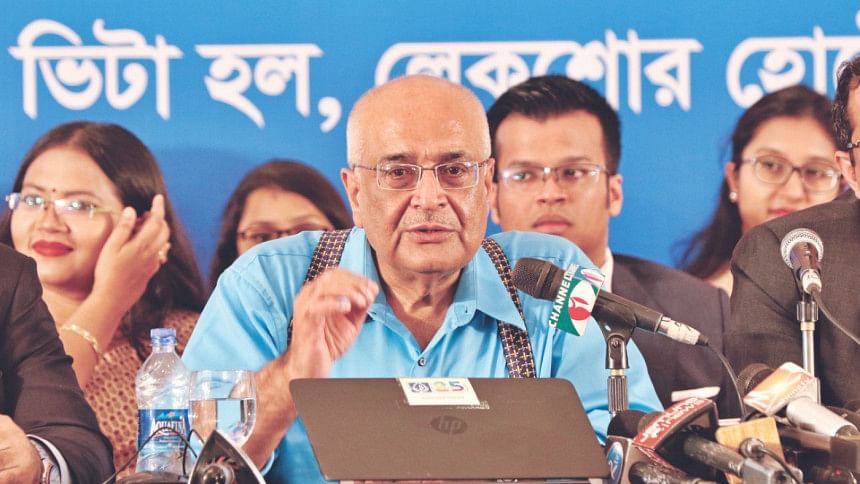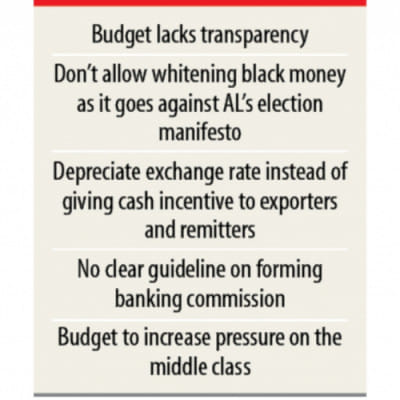The affluent to benefit more

The budgetary measures for fiscal 2019-20 will favour the beneficiaries of “economic misrule” and hurt the middle and lower mid-income groups, the Centre for Policy Dialogue said yesterday.
The think-tank said greater benefits have been offered to the affluent in the Tk 523,190 crore expenditure plan for the next fiscal year, up 18 percent from the outgoing FY.

As a result, the growing middleclass and lower middleclass groups will not benefit as much because the fiscal measures laid out in the budget will not be able to ensure quality education, better healthcare and good mass transport system, said the CPD.
“The main issue here is what measures have been taken for those who cannot go to Bangkok, Singapore, America or London for quality healthcare and education for their near ones,” CPD Distinguished Fellow Debapriya Bhattacharya told a press conference at the Lakeshore Hotel in the capital.
On tax measures, the CPD said the surcharge-free net wealth limit had been hiked, but no measure had been taken for taxpayers in the lower income threshold.
“This is a contradiction and is against the election manifesto [of the ruling Awami League],” he said, adding that the new VAT law would also badly affect the middle-income people.
“Any society where inequality and discrimination rise cannot move forward. It would be difficult to retain 7-8 percent GDP growth, given the way inequality is rising in Bangladesh,” he said.
The CPD organised the briefing to share its analysis on the budget proposals placed by Finance Minister AHM Mustafa Kamal on Thursday.
Kamal plans to collect Tk 381,978 crore in revenue to fund 73 percent of the total expenditure. The revenue target is 19 percent higher than the target set in the revised budget for the outgoing FY.
Debapriya said the aspiration of becoming a middle-income nation depended on the steps taken to support the middleclass people, who he said had been the driving force of economy throughout the history.
In its analysis, the CPD lauded various measures and termed projections of private investment and revenue collection realistic considering the current scenario.
But it criticised the government’s move to allow investment of undisclosed money in industries and properties without any question as well as the absence of any measures to carry out reforms.
It also says the budget lacks many vital specifics and concrete timelines for creating more jobs as well as for increasing the number of taxpayers to 1 crore.
“Emerging challenges in the economic management have largely remained unaddressed,” said the CPD.
It said the budget did not reflect the election manifesto of the ruling party, particularly the amnesty for black money holders.
Debapriya said Bangladesh was now at a frontier and it already enjoyed the fruits of the first-generation reform.
“But without a second-generation reform, the prospect of its advancement will be limited,” he said.
But sadly, reforms in many areas face resistance from the beneficiaries of loan scams and capital market scams, he added.
“They do not want to see any changes as they will be affected by those changes,” he said, adding that these people even opposed the formation of a banking commission fearing it would expose their anomalies.
“It is a matter of sorrow that we have not seen political commitments or economic strategies to bring changes,” he said.
The CPD also said the government’s reliance on the banking sector would grow because of the low revenue collection.
Of the deficit of Tk 141,212 crore, the government wants to borrow Tk 47,364 crore from banking sector and the rest from non-bank and foreign sources.
Debapriya doubted whether banks could spare such huge money when they are facing liquidity crisis themselves.
In addition, the rising pressure on foreign exchange reserves due to higher imports compared to exports and remittance inflow remain unaddressed.
The CPD opposed the government’s plan to provide 1 percent cash subsidy to garment exporters and 2 percent to remitters, as they will create fiscal burden.
It said gradual devaluation of taka would serve both exporters and remitters better.
The think-tank recommended that the government increase allocation for agriculture and provide Tk 5,000 to each of around 2 crore farmers so that they can recoup parts of their losses due to low paddy prices this Boro season.

 For all latest news, follow The Daily Star's Google News channel.
For all latest news, follow The Daily Star's Google News channel. 








Comments